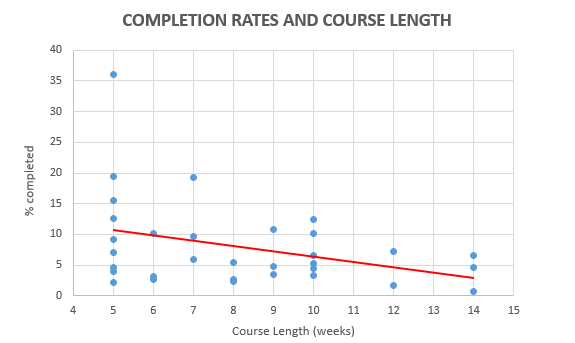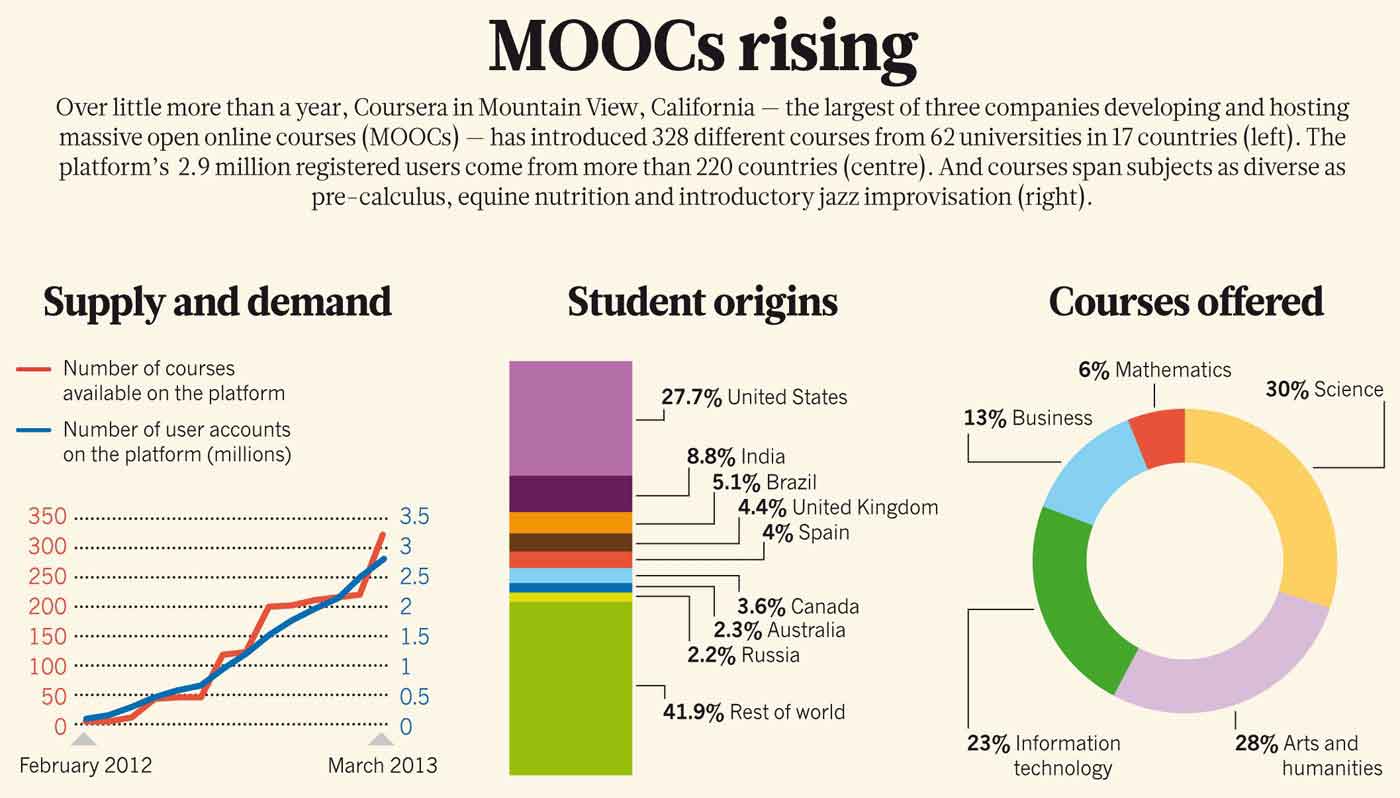MOOC stands for Massive Open Online Course, not many actually know the full meaning behind the abbreviation. Some providers of MOOCs are the following: Coursera, edX, Udacity, Udemy, etc. For more courses and platforms, visit this MOOC aggregating site.
What is a MOOC?
Here’s a pretty thorough video explainer, written and narrated by Dave Cormier, who, you know, only invented the word MOOC:
To find out everything about what MOOC means and what you are offered I suggest you visit Pandodaily.com which has a nice post on it.
Hey…where is the MOOC data?
Finding data about MOOCs is worse than finding a needle in a haystack. I can’t believe how little data is available about MOOCs in the public domain. But then, when you think about it, that’s not surprising. MOOCs aren’t provided by universities or colleges, their providers do not have any ethical responsibilities or are fighting against hundreds of colleges and universities to attract students. They are a business. Pretty much like Facebook, Youtube, or even Tumblr. You won’t find the data online because they have their own websites and have built information on top of it.
Some generic information and data about MOOCS is available; and to all the people who are jumping on to say that MOOCs are the future of education: have a look at the graph below:

What’s that? That is the completion percentage against the course length (of some courses). What I conclude from that is that completion rates fall as weeks pass. So if you take a course on Social Media for 2 weeks, you are fine, but if you are to learn about Thermodynamics which takes 8+ weeks, then never mind.
Is this really the future of education? With such low completion rates? You can find some more data about MOOCs on Katy Jordans’ site about MOOCs. I’ve used data from her site.
MOOCs student demographics
So, from the platforms that offer MOOCs, what do the student demographics look like? Before we look at that, would you believe it if I said that your university does not have a single student from China? Or that the number of Chinese students in your university are lower than the number of Spanish students? No.
China is booming and their students are really travelling abroad to get more knowledge and education. The latest figures show that around 3,500,000 people decided to study abroad in 2009, up over 200% from 1975! One in five of these students are from China or India, and 15% of all students in the UK are international students.
Now look at the MOOC student demographic data snippet below:

The image above is from Scientific American. China does not feature in the top 8 MOOC student consumers. I am probably not the only one to think, “why’s that?” With UK universities focusing on international students a lot (I think for monetary purposes, but they may have more moral reasons), it is surprising to see universities trying out MOOCs when their international target market does not receive those platforms well.
OK, So how do we make sense of MOOCs?
Sir John Daniel, Fellow – Korea National Open University, has produced a white paper on that. In that he writes about the rapidly evolving MOOCs. So much so that he has even documented how quickly the definition of MOOC kept changing on Wikipedia in a couple of weeks.
Taking an excerpt from his abstract “While the hype about MOOCs presaging a revolution in higher education has focused on their scale, the real revolution is that universities with scarcity at the heart of their business models are embracing openness. We explore the paradoxes that permeate the MOOCs movement and explode some myths enlisted in its support. The competition inherent in the gadarene rush to offer MOOCs will create a sea change by obliging participating institutions to revisit their missions and focus on teaching quality and students as never before. It could also create a welcome deflationary trend in the costs of higher education.”
Have a look at the white paper about MOOC. Although it is 21-pages long, it makes for a grand reading about understanding some of the issues that may arise out of the existence of MOOCs in the future.
Do you love or hate MOOCs?
I don’t hate MOOCs. But I am not going to jump onto the bandwagon and say that if you are not on a MOOC, you are nowhere.
Let me explain. Online education is not a new thing. We’ve had the Open University for quite a while. Neither is distance learning a new thing. What’s new are the platforms. Well built platforms. Technical advancements do not necessarily mean that something new is born. And neither does it mean it is the best the world can have.
For example, Facebook wasn’t a new thing. We had scrapbooks and photo albums before that; technology just put these things online. And I am not making fun of it, I am serious. Right now MOOCs just allow students to learn at a fraction of the cost of the original course. But isn’t that what any ‘online’ business is supposed to do? Isn’t it similar to Amazon?
These MOOC platforms are there ‘for profit’, there is no doubt about it, and we all know how crap the user experience becomes once an online entity has to start making money. Do you know that Coursera doesn’t make any money yet? It lives off investment. And hence the flexible terms on contracts with universities.
Universities are quite sly at the moment with MOOCs. They are simply trialling out ‘stuff’ to see what works and what doesn’t. They don’t spend a penny in development of these external MOOCs. Eventually, these MOOC platforms will want to make money and I would like to see any university Vice-Chancellor or President happily go, “here, take my money”.
Universities will get something ‘in-house’ not to rival MOOC platforms, but rather fight against their traditional university competitors who they fight against even now (fight = marketing drive to pull students, not literally fight!). Again, remember Amazon made it easy for sellers to sell things, but brands still have their own online shops!
How have universities experienced MOOCs?
I wouldn’t know, because I haven’t had any internal discussions with any staff members at universities, but the University of Edinburgh has produced this report on their stint with MOOC offering.
It makes for a great reading and some points are well picked out in this blog
- “One spin-off from our early engagement with MOOCs has been a lively internal debate about pedagogy, online learning and costs/benefits of university education.”
- “Based on local experience with taught online courses and participation in early MOOCs, we decided to develop only short duration courses, 5-7 weeks in length. We expected this to aid retention of participants by giving them an easily manageable timeframe for their learning commitment.”
- “All Edinburgh MOOCs were designed from scratch, drawing where appropriate on existing academic programmes but in the main being created expressly to be new MOOCs rather than adaptations of existing courses.”
- “It surprised us that so many of our learners appeared to be very well educated despite the undergraduate entry-level of five of the MOOCs.”
- “It is probably reasonable to view these MOOC learners as more akin to lifelong learning students in traditional universities than to students on degree programmes, which is a common comparison being made.”
- “There was some evidence that the respondents of the Exit survey were more independent that social learners, with high self-reported time spent on videos and quizzes and less on social activities.”
You can download the report on MOOC by the University of Edinburgh. We need to thank them for that, “Thank-you!”
So that’s all about MOOCs for now. There is so much more I could write about MOOCs; and I for one will be keen to see how the platforms evolve and the next move by universities. I won’t write off any university not taking on MOOCs yet; if your market is not that, your market is just not that. No point forcing something into your market that doesn’t work.
Oh, and there is no way there wouldn’t be an infographic on MOOCs yet. So here is one that I find good to use.


